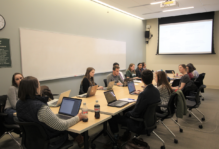Gaining a New Lens for Colonialism through GRI’s Summer Fellows Program
By Emma Schmidt ’21
This semester I am taking a class on the politics of Africa with Professor Phil Roessler, who was also the professor in charge of my GRI Summer Fellowship. On our first day of class, he asked us to share the first word that came to mind when we thought of Africa. As a result of the work I did over the summer, the word that immediately came to mind was diverse.
If you had asked me this question a few months ago, I’m not sure what I would have said. Honestly, I knew very little about the continent prior to the summer. And thinking back, I’ve realized that the little I had learned about Africa was always tied back to either the United States or Europe in some way. I remember learning about apartheid, but in the process, it was compared and contrasted with our civil rights movement. A relevant and interesting comparison, yes. But this is part of a larger, more problematic pattern. When I learned about slavery, I learned phrases like “triangular trade” and “transatlantic slave trade” that painted a deeply troubling but relatively simple picture of raw materials being transported from America to Europe, of manufactured goods being transported from Europe to Africa, and of slaves being captured in Africa and transported to America. While slavery’s impact on America was emphasized, slavery’s impact on African societies was all but ignored.
Similarly, when learning about colonialism prior to this summer, I learned about the Berlin Conference and the Scramble for Africa, and the fact that most African countries gained independence from their colonial powers in the 50s and 60s, but next to nothing about how colonialism impacted the lives of various African societies. In fact, Africa was often treated as a single country rather than a vast continent. Colonialism was said to have “changed the African way of life” without any discussion as to what that way of life was, let alone the fact that there is no such thing as a single African way of life but rather countless societies across a continent whose land mass is larger than the US, China, and India combined.
This summer gave me the opportunity to look at colonialism from a different perspective. Put simply, my role in Professor Roessler’s research was to investigate how the adoption of cash crop farming (usually a result of colonization) affected various ethnic groups. I read academic articles, books, formal resorts – frankly, anything I could access electronically – working to answer various questions, such as: How did this group come to adopt cash crop agriculture? How did the cash crop revolution affect infrastructural developments in the region? What methods did colonial administrators use to encourage cash crop production? After the region gained independence from their respective colonial power, did their cash crop capabilities shape their political power?
In answering these questions, I saw common themes. For example, gender roles frequently shifted as a result of the adoption of cash crop agriculture. But even as I researched ethnic groups that fall within the same modern-day country borders, I saw the diversity of the people of the African continent. Some ethnic groups fought aggressively against the onset of colonial rule, while others teamed up with colonial forces to conquer nearby ethnic groups and place them under colonial rule as well. Some had a system of family-based subsistence agriculture prior to colonization, while others intentionally grew more crops than needed for subsistence and had established trade with nearby ethnic groups well before Europeans arrived. Land tenure varied greatly, with some ethnic groups recognizing individual rights to land and others using a communal land rights system prior to colonization.
While conducting this research, I was able to learn about how colonialism changed these ethnic groups rather than learning about how colonizing these ethnic groups shaped Western powers. This sounds simple and obvious – of course we should be learning about the history of the African continent from the perspective of Africans rather than from the perspective of Europeans (or Americans). But unless you are taking a course specifically on Africa, the continent is frequently overgeneralized, stereotyped, and viewed through a Eurocentric lens. By taking classes like Politics of Africa, I’m working to correct this gap in my education. But in the future, I hope that this information is taught alongside European history instead of in the shadow of it.




No comments.
Comments are currently closed. Comments are closed on all posts older than one year, and for those in our archive.